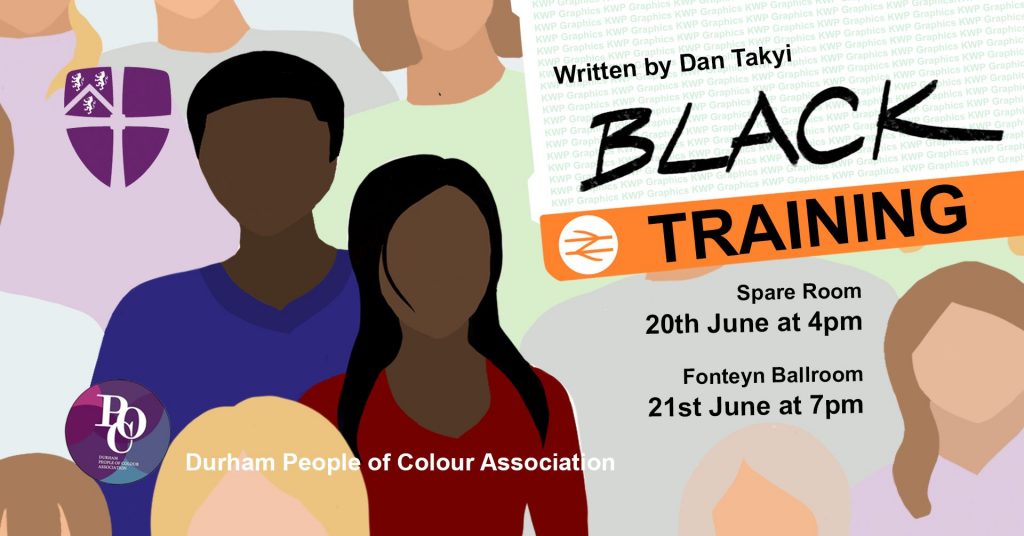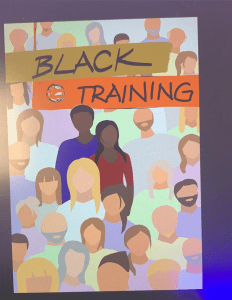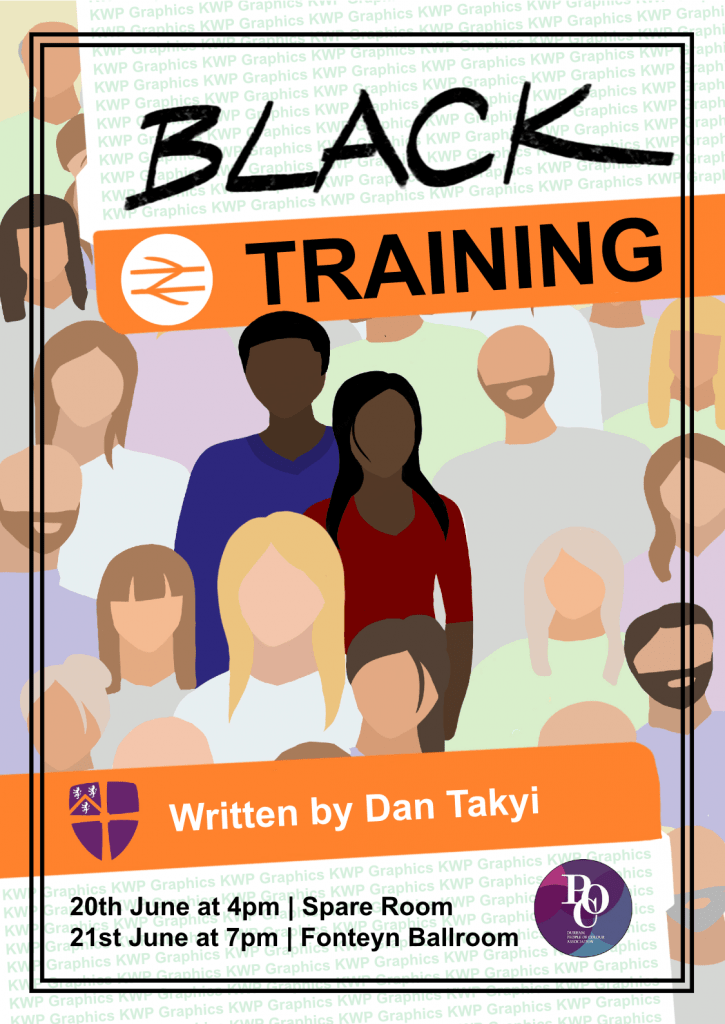
The Black Training poster, designed by the incredible Kristen Price, has it’s own story to tell in terms of artistic vision
“And it will be no little credit to the University of Durham for history to have to record that she was the first to throw open to Africa the full privileges of a liberal education.” –Durham University Journal, 1843
“it would not be much longer before the University of Durham was affiliated to the Zoo” -London Times, 1843
It’s a story about two black people getting on a train and experiencing various microaggressions, so in short Black Training is a tale of everyday life.
A writer’s note usually just consists on some background on how the play came about to being, but this play has a relatively simple backstory with so many experiences for people of colour mixed into it. When I wrote this, I wanted to explore the different meaning of microaggressions, but from the other side. As in, when you’re first told about microaggressions, you’re told that people of colour feel uncomfortable by then, and you try to empathise with us. It’s noble. If you’re one of those who it doesn’t apply to, you acknowledge that other people need to learn and move on. But what you’re never told to do is consider the thought processes of those who are actually exhibiting those microaggressions. And that’s what I wanted to do, put you in the mind of those who believe they have no racist bone in their body- not intentionally racist anyway. To them, it’s just logical reactions but to illogical assumptions they have formed in life.
All reality is a construct. We exist in relation to our social ties. Our environment has programmed us to make these illogical leaps of assumption which makes us believe that we are logical in our biased responses. Whether it’s racist or not, our priority is to look after ourselves. If you see a person of colour walking down a dark alley, turning around and going the other way is basic self-preservation. Seeing your child walking up to a person of colour in the park and grabbing them away is justified by refusing basic stranger danger. Nobody can blame you there. Then all of a sudden, you don’t do the same thing when it’s a person of the same colour as you. But you can justify it to yourself. Now what happens when you challenge yourself? What happens when you think about why someone would do this? Then you have the chance to think ‘am I doing this too?’
“And yet in our world, everybody thinks of changing humanity, and nobody thinks of changing himself.” Now we have established that we aren’t perfect, that we all fall short, we can take a moment to examine ourselves, and that’s where our secondary characters come in. Our audience surrogates. They all are here to provide you a different perspective of what’s going on- eventually you challenge yourself. All the world’s a stage after all, and the audience are part of our players- you are the passengers and they reflect you- art imitates life after all. First you get to look in on the out of touch- a woman from another time, deplorable behaviour, poor logic, but wholly justified in her mind. Then you get the middle aged woman, a could have been in the world, but now she has settled into where she is, she has someone to look out for, that is priority. Once more, questionable logic, but justified for her position- this time it’s selfless. Finally, the passengers, they’re where we come in. They’re not out of time, they’re not could have beens, they still could be, lives of infinite potential, and yet the illogical rationale has been passed on. They feel hard done by, the world has done them dirty but after a life of privilege, equality seems like a disadvantage. This where you come in, that these processes are shown in reverse of how they develop. If it’s unchallenged at the end, it is fully fertilised at the beginning. And there’s nothing to be done about it- it’s too late to change? Or it’s too late to care enough to change. The next step would be you- the audience, consider where you come into it.
One of the greatest shames for me is that the part of the child was cut. The child was a naïve, innocent character with no preconceptions and served to ask questions that were just ignored consistently, ending with a poignant stage direction of the innocent, uncorrupted child taking the side of the unconscious biases passed on by unknowingly choosing the racist side. Child represented an ignored consciousness asking you why you were doing this, what was the purpose for this, why are you ignoring what you say in private when it comes to the real life occasion? It was a nice way to establish how these prejudices came about to being, by picking up bad habits as a child and the adults not realising that they hold them too to correct them.
It is imperative we establish that these secondary characters are not racist. They’re self-interested, yes; they’re over-protective, yes; they’re feeling hard done by, yes; but they are not racist. They do however hold racist views, and they have been allowed to manifest because they’re unchallenged. This is why in the case of overt racism, they would all jump to the defence of the abused- because they are good people. And because they are good people, they can do no wrong. People can be more than one thing though- a recurring motif. You can be a good person, a hero, but still have racist views being held- a white saviour. But because you’re doing the right thing in the big moments, you’re not part of the problem, you can do no wrong because you would do the right thing when the gauntlet is thrown down. I guess it’s a case of tag yourself, which secondary character are you? Which secondary character did you not consider? Racism is not fun, but it can be explored through entertainment. Sometimes theatre is the best medium to learn.
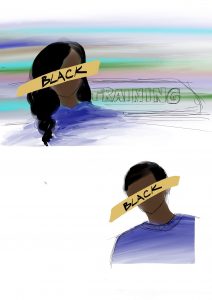
An early poster draft, whilst Kristen will probably be fuming that I used this, I still think it’s incredible!
Now onto our leads. I don’t want to say too much about them because this story is very easily identifiable if you know who they are. Because they are you. I was recently talking to different staff members, trying to convince them to do a TEDxDurham talk about their experiences at the Uni, just to give funny stories and anecdotes. They all said of how they loved the idea but were in the wrong mindset due to the recent cuts- and that’s fair enough. We accept this, it’s completely acceptable. So why exactly are people of colour always expected to unpack their emotional trauma for the education of others, without fail? It is draining especially when people don’t want to learn. So I am not going to provide you a tale of the person of colour experience, I don’t have that effort, but the show gives you an insight. People of colour will identify, non-POCs will get a glimpse of just how tiring it is. But I guess this is also an appreciation for the POC experience and hopefully we can all identify with what’s going on. A bit of much needed representation and empowerment that we can all do with. So to POCs of Durham, these characters are my love letter to you, you deserve someone you can finally relate to.
Whilst I realise this is getting very long, I will not yield my time just yet as there’s still so much to tell. If we go through scene by scene, we can see different experiences drawn on from my own life, my family, my friends. The throwaway stories of ridiculous rubbish that has had to be put up with are all true stories, either from when my family first moved houses to the post-racial Midlands, or from my time at University, or my friend’s very own train journey. These are the little things that make us uncomfortable which the perpetrators don’t think twice about but they plague our everyday existence. It’s exhausting to even recap let alone to experience.
The use of spoken word to teach lessons in our experiences forms another motif of how we always have to perform to be heard. Our message isn’t listened to if we aren’t entertaining you all, an irony not lost on me considering the fact we’re doing a theatre performance to educate once more, alas at best we can be self-aware.
Putting on this show has been an experience. From writing it last minute to a deadline then having it taken on very graciously by Pitch Productions, it’s all been a learning curve. From being told, very fairly, that I couldn’t AD it to then Executively Producing it, it’s been a wild ride. Although it hasn’t been without it’s struggles. When a producer questions whether it was racist to state that I wanted a black director, and then the peak of representation being that we should have music from black artists, we edged closer to despair.
We now have an all POC production team, from our might producer Darrius, to Kristen’s amazing promo designs, this has been a joyous experience to be a part of. We have assimilated our white cast mates into POC culture, and we hope you join that experience too.
We explore many different underlying themes, identity, representation, what it means to be black in Britain, how to be an ally to POC in Britain, how to balance the act of being true to your heritage and being true to your environment, and so many more- so come along for our train ride of microaggressions, truly the struggle is this way.
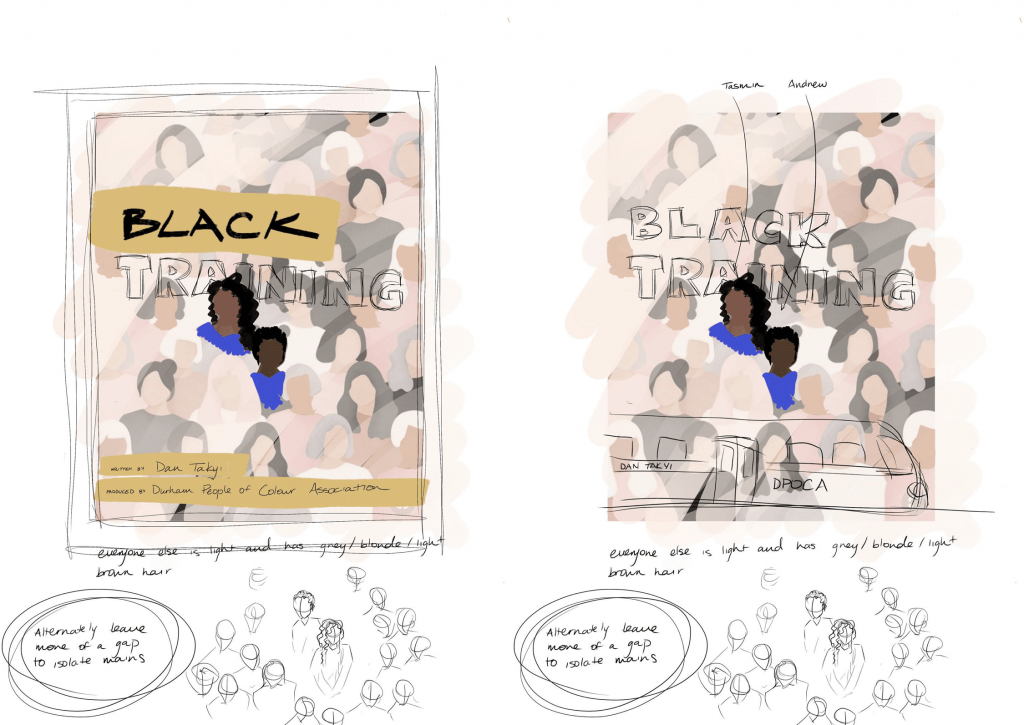
When you work with a perfectionist, you get to appreciate the process, and all of it is amazing from the start to completion
Black Training opens at Spare Room, 4pm on Thursday 20th June and is on again at Fonteyn Ballroom, DSU Friday 21st June at 7pm. Tickets available here

